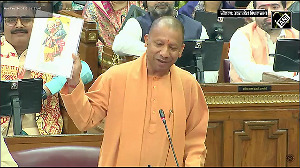Mani Shankar Aiyar, former Indian diplomat-turned-politician, on Monday said the only way to resolve the problems between India and Pakistan is uninterrupted bilateral dialogue despite the bomb blasts in Mumbai in 2008 and Islamabad's allegations against India for its own troubles.
Delivering an address at the Indian Consulate in New York, Aiyar said that while both Pakistan and India are the 'albatross' on each other's neck there are ways to resolve the issues".
"I am unable to comprehend a foreign office which knows how to make friends with Paraguay, but is bewildered about what to do about Pakistan," he said.
"The fact of the matter is that it is so much easier to paint Pakistan and its establishment in monochromatic colors and to deal with a sworn enemy I am bewildered at our inability to make friends with our neighbors."
'We are divided by history, but we are conjoined by geography. While Pakistan is smaller than India in every dimension, it is a very large country by itself. And we cannot wish them away, and if we have to live together, is it so difficult to make friends with the people of that country who but for the accident of partition, will be our fellow citizens,' he asked.
Aiyar, who was here to promote his two books, Confessions of a Secular Fundamentalist and A Time of Transition: Rajiv Gandhi to the 21 Century said that bilateral relations could be promoted through people to people contact.
He stressed the need for intelligent, rational and human resolution to problems between the two countries.
Aiyar, who spoke for more than one-and-half-hour to the apparent chagrin of some of the guests present because of his lengthy speech, had among the members of the audience Pakistan Permanent Representative to the United Nations Hussain Haroon who was seated next to India's Permanent Representative Hardeep Puri.
Among other present were Ahmad Kamal, former Pakistan ambassador to the UN. Former Indian Consul to New York Neelam Deo, who retired last year, was also present.
In his address, Aiyar also stressed the need to restore the moral content to India's foreign policy that he prevailed during the era of India's first prime minister Jawaharlal Nehru. 'It has somehow become politically incorrect refer to foreign policy and morality."
The former minister said, quoting Nehru, that the first prime minister believed that in stead of promoting the 'dominance concept' in foreign policy it is better to promote the concept of equality of all and try to be the 'first among equals.'
'I think it is very important that the moral content is restored to our foreign policy and economic interest subordinated to overall moral content,' he said.






 © 2025
© 2025